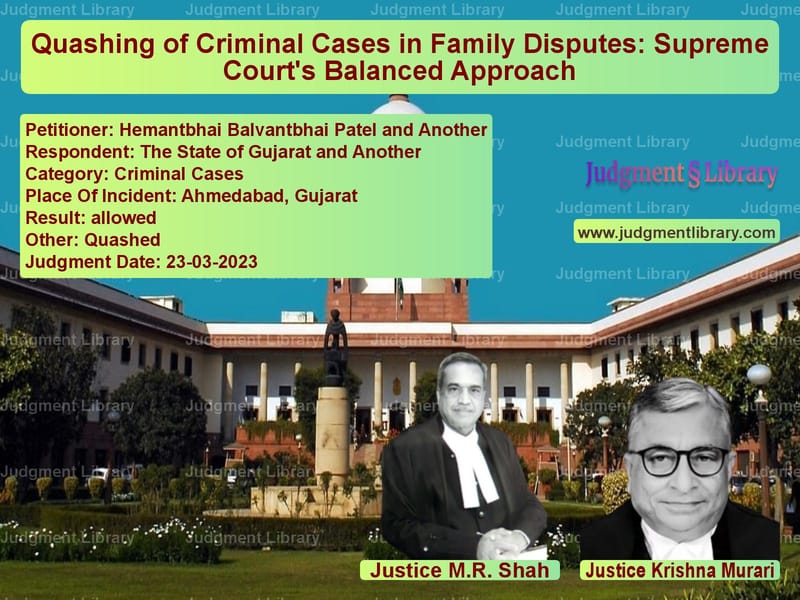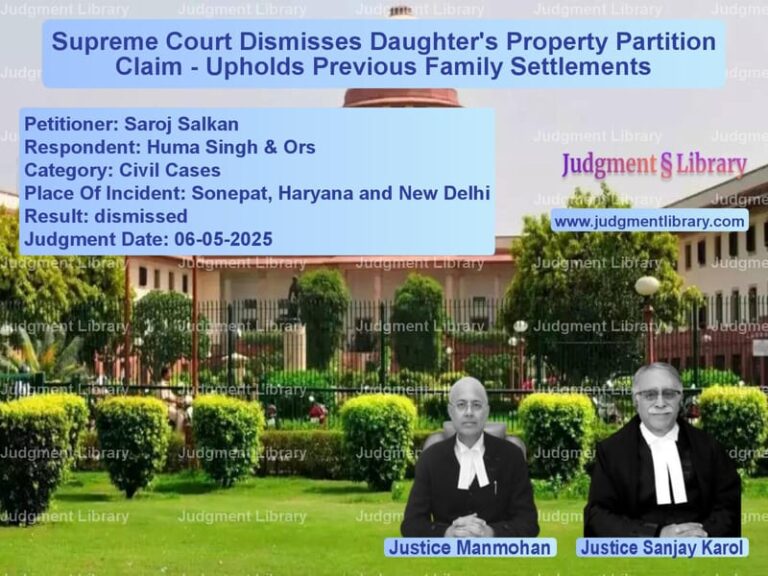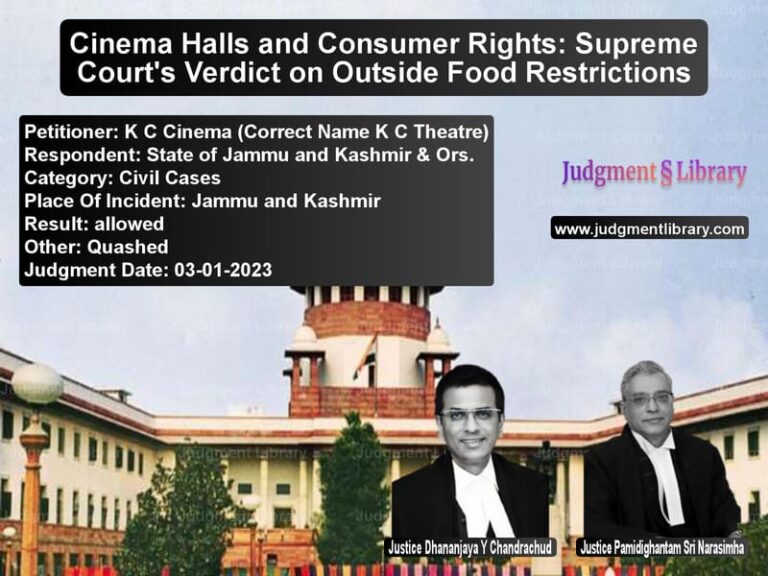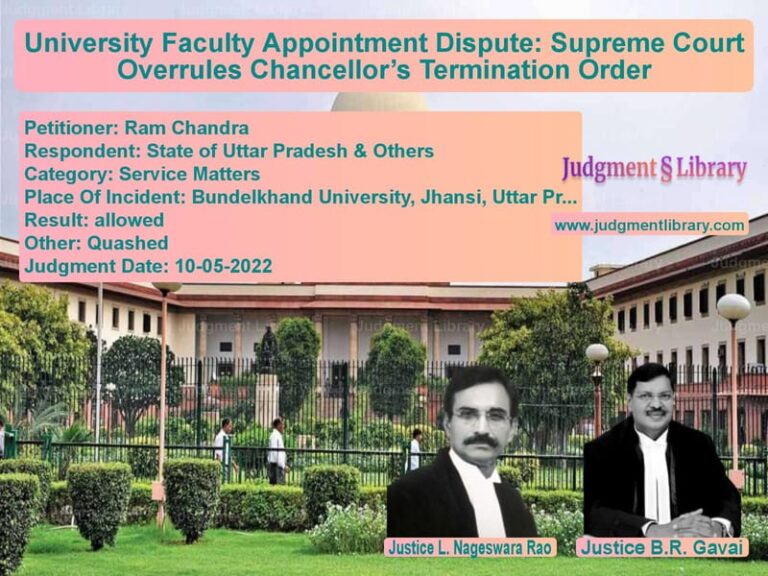Quashing of Criminal Cases in Family Disputes: Supreme Court’s Balanced Approach
The case of Hemantbhai Balvantbhai Patel and Another v. The State of Gujarat and Another revolves around a complex family dispute that resulted in criminal proceedings. The Supreme Court of India was faced with the task of determining whether the continuation of the criminal cases was necessary or whether they should be quashed in the interest of justice, especially considering the familial relationships involved.
The central allegation was that the appellants, the son and grandson of the complainant, had forged her signature to add the second appellant to a joint bank account and then withdrew Rs. 10,50,000. In retaliation, the complainant filed an FIR, while the appellants had already lodged an FIR against the complainant in another case. This prolonged legal battle raised the fundamental question of whether criminal prosecution was the best course of action in this family dispute.
Background of the Case
The dispute originated in Gujarat, where the complainant, who is the mother and grandmother of the accused, alleged that her son and grandson had engaged in fraudulent activities concerning a joint bank account. Specifically, the allegations included:
- Forgery of the complainant’s signature to add the second appellant (grandson) as a joint account holder.
- Subsequent withdrawal of Rs. 10,50,000 by the second appellant.
In response, the complainant filed an FIR under I-C.R No.293/2007 at Sarkhej Police Station. However, prior to this, the appellants had already filed an FIR against the complainant under I-C.R No. 337/2007 at Satellite Police Station. This led to two parallel criminal cases involving close family members.
Arguments by the Parties
Arguments by the Appellants
The appellants, represented by Shri Saif Zia, argued the following points:
- The forensic analysis (FSL report) confirmed that the disputed signatures (D3 and D5) matched the original signatures of the complainant (D1, D2, D4, and D6).
- The case was more of a personal and financial misunderstanding rather than a criminal act.
- The family dispute should not have escalated into criminal litigation.
- The appellants expressed willingness to return the full amount of Rs. 10,50,000 along with 12% simple interest to resolve the matter amicably.
Arguments by the Respondents
The complainant’s counsel, Shri Siddhartha Dave, argued against the quashing of criminal proceedings, stating:
- The trial court and revisional court had found enough prima facie evidence to continue the case.
- The courts had previously refused to discharge the accused, so quashing the case would undermine legal procedures.
- However, the complainant agreed to settle the matter if her own case under I-C.R No. 337/2007 was also quashed.
Legal Analysis by the Supreme Court
Quashing of Criminal Proceedings Under Article 142
The Supreme Court, exercising its powers under Article 142 of the Constitution of India, noted that:
- Continuing the criminal proceedings would not be in the best interest of the parties.
- The case involved a family dispute that had turned into a legal battle, which should be settled amicably.
- The forensic report (FSL Annexure P-2) showed no conclusive evidence of forgery.
Precedents Considered
The court referred to past judgments where criminal cases involving close family members were quashed to restore family harmony. The Supreme Court observed that legal disputes arising within a family should ideally be resolved outside the criminal justice system when possible.
Key Findings
- The forensic analysis did not provide substantial evidence of forgery.
- The familial relationship (mother, son, and grandson) suggested that reconciliation was preferable to prolonged litigation.
- The appellants voluntarily agreed to repay the amount with interest.
Conclusion of the Judgment
The Supreme Court ruled:
- The criminal proceedings in I-C.R. No. 293/2007 against the appellants were quashed.
- The parallel criminal proceedings against the complainant in I-C.R. No. 337/2007 were also quashed.
- The appellants were directed to return the full amount of Rs. 10,50,000 with 12% simple interest from June 1, 2007, within one week.
Impact of the Judgment
The Supreme Court’s ruling reaffirms that family disputes should not always lead to criminal prosecution. Instead, amicable settlements should be encouraged, especially when both parties agree to resolve matters outside of court. The decision highlights the judiciary’s role in balancing legal enforcement with social harmony.
The ruling also emphasizes the importance of verifying documentary evidence before initiating criminal proceedings, as reliance on mere allegations can lead to unnecessary litigation.
Petitioner Name: Hemantbhai Balvantbhai Patel and Another.Respondent Name: The State of Gujarat and Another.Judgment By: Justice M.R. Shah, Justice Krishna Murari.Place Of Incident: Ahmedabad, Gujarat.Judgment Date: 23-03-2023.
Don’t miss out on the full details! Download the complete judgment in PDF format below and gain valuable insights instantly!
Download Judgment: hemantbhai-balvantbh-vs-the-state-of-gujarat-supreme-court-of-india-judgment-dated-23-03-2023.pdf
Directly Download Judgment: Directly download this Judgment
See all petitions in Fraud and Forgery
See all petitions in Judgment by Mukeshkumar Rasikbhai Shah
See all petitions in Judgment by Krishna Murari
See all petitions in allowed
See all petitions in Quashed
See all petitions in supreme court of India judgments March 2023
See all petitions in 2023 judgments
See all posts in Criminal Cases Category
See all allowed petitions in Criminal Cases Category
See all Dismissed petitions in Criminal Cases Category
See all partially allowed petitions in Criminal Cases Category






